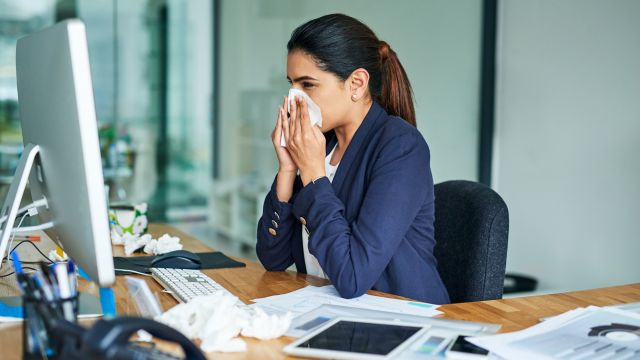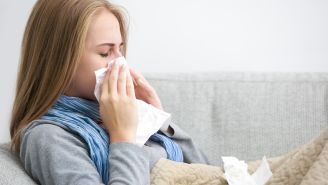Updated on November 20, 2024.
Since the COVID-19 pandemic, the circulation of viral bugs has become more unpredictable and ongoing. And close quarters at work along with shared kitchens, bathrooms, and conference rooms can hasten the spread of the flu, COVID, colds, respiratory syncytial virus (RSV), and other germs.
But even if skipping work or seeking refuge in your home office aren't viable options, it’s not inevitable that you’ll come down with a bug yourself.
Protecting yourself in and out of the office doesn’t have to be complicated. Here’s what you need to know.
Stay up to date with vaccinations
Be sure to get both the latest COVID vaccine and your annual flu shot. They’ll help protect you from severe illness and can help to keep you from spreading illness. Some groups should also be vaccinated against RSV.
You can get vaccinated at your physician's office, a local clinic, or a nearby pharmacy. Try an online vaccine locator to find a convenient spot near your home or office.
COVID vaccine
Even if you’ve already been vaccinated and boosted in the past, it’s important to continue to stay up to date: Everyone who is at least six months old should get the latest updated COVID vaccine. This is because over time, the protection a vaccine provides weakens, and meanwhile the COVID virus itself is constantly changing and mutating.
It's particularly important to get vaccinated if you’re in a high-risk group, which includes anyone 65 years or older, those who have never been vaccinated, and those who have medical conditions that put them at higher risk for severe illness, hospitalization, or death.
This includes people with genetic, metabolic, or neurologic conditions, or people with congenital heart disease. People who are immunocompromised, or who have obesity, diabetes, asthma, sickle cell disease, or chronic lung disease, are also at higher risk of severe illness.
Flu vaccine
There are various strains of the flu, but the seasonal flu vaccine helps protect against the ones researchers believe will be most in circulation each season. The Centers for Disease Control and Prevention (CDC) recommends that everyone six months of age or older be vaccinated annually.
Some groups are at particular risk of flu-related complications. These include pregnant people, adults over age 65, children younger than five and especially younger than two, and adults with other health conditions, including asthma, heart disease, stroke, diabetes, and chronic kidney disease. Anyone with conditions that affect their immune system are also at risk, such as people with cancer or HIV/AIDS.
It's especially important for members of these groups to get vaccinated. If they aren’t vaccinated and they contract the flu, potential complications can be relatively mild like sinus or ear infections, or as severe as life-threatening pneumonia, sepsis, or brain inflammation. The flu can also make chronic conditions like asthma or heart failure worse.
The CDC recommends getting vaccinated in September or October, before the flu begins affecting your community. But the flu shot can be effective throughout flu season, which typically runs from October to as late as May. As long as the flu is still going around, it’s useful to get vaccinated.
RSV vaccine
The CDC recommends an RSV vaccine dose for anyone who is pregnant, or who is 19 months or younger, age 75 or older, or between the ages of 60–74 and at higher risk of serious illness from RSV. It’s best to be vaccinated late in the summer or early in the autumn, before the peak circulation period of RSV.
Pregnant people should get vaccinated against RSV between weeks 32–36 of their pregnancy, ideally between September and January. This vaccination will not only protect the pregnant person, but also their infant.
The RSV vaccine is not currently an annual shot. Ask your healthcare provider (HCP) when and how often you should get this shot.
Practice virus prevention strategies
To ward off viral infections and to protect those around you, engage in these healthy habits.
Keep your distance
Respiratory infections, including the flu, COVID, and RSV, are spread when invisible droplets—produced when infected people breathe, sneeze, cough, and talk—enter the body, usually through the mouth and nose. Less commonly, you can pick up a virus by touching a surface contaminated with the virus and then touching your nose or mouth.
If you’re ill, consider isolating yourself from others, particularly those who may be at risk of more severe illness if they catch what you have. If a number of your colleagues are under the weather, propose conducting conferences by phone or online in lieu of cramming into airless boardrooms. If you have to be near others, wear a snug-fitting, protective mask. The best masks include KN95 and N95 respirators.
Aim for clean air
If you have to meet with others in an enclosed space, aim to keep the air circulating and as fresh as possible. Open doors and windows. Run bathroom and stovetop exhaust fans. If you’re at home and you have a heating/cooling system that uses ducts to carry warm or cool air throughout the home, make sure to turn the furnace fan to “on” instead of “auto.” Be sure your filter has been changed regularly (every three months).
You can also purchase a portable high-efficiency particulate air (HEPA) cleaner and set it to run in the breakroom or where a group of people is meeting.
If all else fails, try to meet outdoors where there’s plenty of fresh air, rather than indoors.
Keep up basic hygiene
To help keep you and others virus-free, be sure to always cover your nose and mouth with a tissue, or your elbow if you have no tissue, when you have to sneeze or cough. Regularly wash your hands with soap and water—but a quick rinse under warm water won't do the trick. You should scrub for a minimum of 20 seconds, on the backs of hands, palms, fingers, and under the nails.
Most of the time the best soap option is a simple liquid soap. Antibacterial soaps may allow bacteria to become resistant over time, making it harder to kill these germs in the future.
After rinsing your hands, grab a paper towel to turn off the faucet and to avoid picking up germs that may be lurking on surfaces. The same technique can be used on the doorknob when you exit the restroom.
If soap and water aren't available, use a hand disinfectant with at least 60 percent alcohol until you can find an opportunity to give your hands a proper wash. To properly sanitize your hands, rub the product on all parts of your hands until dry; don't wipe the solution off.
Identify and disinfect surfaces at work
Depending on the circumstances, a virus can live on surfaces for anywhere from hours to days, so disinfecting heavily trafficked areas can help prevent the spread of bugs. At home and at work, make sure that frequently touched surfaces like doorknobs, handrails, and tabletops are disinfected regularly.
Wipe down desks, keyboards, and the arms of chairs, too, even if they don't look dirty. Be sure any electronics can withstand the moisture before cleaning.
For best results, wash surfaces first with a household cleaner, wipe clean, then finish with a germ-killing disinfectant. Most disinfectants typically need to be left on the surface for a period of time, so carefully follow the instructions on the package to get rid of germs.
In a pinch, a towel soaked in a solution of bleach and water or soap and water can get the job done, too. Bleach should be diluted before handling, so stir up 1/3 cup (5 tablespoons) of bleach for every gallon of water. Be sure to mix a new bleach solution each day, since bleach loses its effectiveness quickly after mixing with water. When choosing bleach or other disinfecting products, select those approved by the Environmental Protection Agency to kill viruses and bacteria whenever possible.
Adopt healthy habits at home
To help you maintain your overall health as well as possibly boost your immunity, there are a number of lifestyle habits that you can adopt. The most important of these are to avoid smoking, eat a nutritious diet, be physically active, keep a healthy weight, drink alcohol not at all or only in moderation, manage your stress, and get enough sleep.
There's no specific exercise regimen for virus prevention, but guidelines for overall health and wellbeing recommend 150 minutes of moderate-intensity or 75 minutes of vigorous-intensity physical activity each week.
Couple your walks, runs, or bike rides with a healthy diet rich in fruits, vegetables, whole grains, lean protein, and heart-healthy fats.
And don’t forget your seven to nine nightly hours of sleep. If you're struggling to get a good night's sleep, try creating a sleep schedule and sticking to it. It also helps to avoid large meals, caffeine, and the use of electronic devices close to bedtime. And remember to keep your bedroom cool, dark, and quiet.
Even with these risk-reducing precautions, catching a viral respiratory infection is always a possibility.
If you do come down with a virus, do your best to isolate yourself and avoid contact with others—especially if you test positive for COVID, or if you live or work with people who are at higher risk of severe illness from COVID, flu, or RSV.
If possible, remain home for at least 24 hours after your fever has gone down (without the help of fever-reducing medications)—and make sure you can tell your symptoms are improving overall. After that you can return to your daily activities, but take extra precautions like wearing a mask, physical distancing, testing, keeping the air clean, and practicing good hygiene.
If you're at high risk for complications—a group that includes people with asthma, diabetes, heart disease, pregnant people, and young children—contact your HCP immediately. Your HCP may prescribe antiviral medication, which could mean the difference between a mild sickness and a serious illness.







